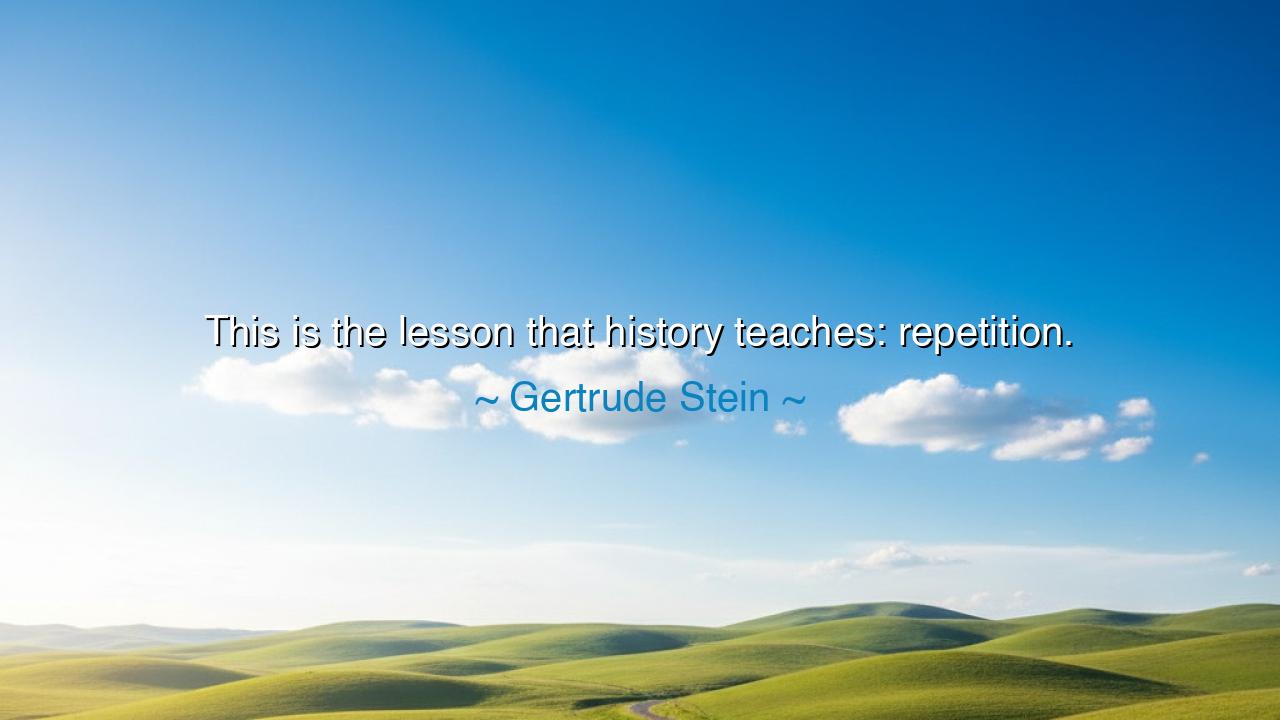
This is the lesson that history teaches: repetition.






“This is the lesson that history teaches: repetition.” – Gertrude Stein
Listen, O seekers of wisdom and watchers of time, to the words of Gertrude Stein, poet of perception and chronicler of human thought. In her brief yet piercing declaration—“This is the lesson that history teaches: repetition”—she speaks a truth as old as civilization itself. Beneath the simplicity of her words lies a haunting revelation: that humanity, though clothed in progress, walks ever in circles. The empires change their names, the faces of rulers fade, but the passions of men—their greed, their fear, their hope—remain the same. Thus history, like a patient teacher, repeats its lessons again and again, for we are slow to learn what we most need to remember.
Stein was a woman who lived through the storms of the twentieth century—two World Wars, revolutions, and the birth of modern thought. She witnessed the breaking of old orders and the rising of new ones that soon began to decay in the same way. Her words do not come from cynicism, but from clarity. She saw that history’s pages are filled with cycles: of war and peace, freedom and tyranny, enlightenment and ignorance. Each generation believes itself unique, yet each reenacts the same drama of power and pride. The actors change, but the script endures. In this truth lies both tragedy and hope, for though repetition brings suffering, it also brings renewal—the chance to learn anew what we once forgot.
Consider the tale of Rome, that mighty empire which rose from discipline and law, only to fall beneath its own indulgence and division. Centuries later, nations across Europe would walk the same path: building greatness through unity, and destroying it through corruption and excess. So too in the modern age, we see the repetition of arrogance—the belief that “it cannot happen again.” But as Stein teaches, history is a wheel that never ceases to turn. Those who ignore its motion find themselves crushed beneath it, while those who understand its rhythm may learn to ride it toward wisdom.
Stein’s insight echoes the wisdom of the ancients. The Greek historian Thucydides, writing of the Peloponnesian War, said that human nature ensures that history will always repeat, for men are driven by the same desires—fear, honor, and gain. He wrote that those who read history not for amusement but for understanding would see their own reflection in the deeds of the past. Likewise, Stein, centuries later, reaffirms that repetition is not merely a pattern of events—it is the mirror of the human soul. Until we change within, the outer world will remain bound to its cycles.
Yet her words carry not only warning but also possibility. For in repetition there is rhythm, and in rhythm there is learning. The wise do not despair of history’s cycles; they study them, discern their currents, and seek to transform them. Just as the seasons repeat but each spring brings new growth, so can humanity evolve even within its recurring struggles. The repetition of history need not be an eternal curse—it can be a spiral, rising higher each time we remember what came before. Stein’s lesson, then, is not to escape repetition, but to awaken within it—to recognize the pattern and, through awareness, to break the chain of blindness.
Reflect, O listener, upon your own life, for the cycle of repetition is not only found in nations, but in the hearts of individuals. How often do we repeat our mistakes—our anger, our pride, our neglect—believing each time that it will be different? How often do we fail to see that history lives within us? To study the past, whether personal or collective, is to see the loops of cause and effect that bind us. To learn from them is to free ourselves from their grasp. In this sense, to remember is the most radical act of all.
So take this lesson to heart: do not turn away from history’s repetition—study it, understand it, and rise above it. Read not only the victories of men, but their failures; not only the progress of nations, but the follies that destroyed them. Let memory be your compass. The world will circle endlessly, but you, through reflection, may walk a higher path. For those who remember with humility and act with wisdom may yet transform repetition into revelation.
And thus, as Gertrude Stein teaches, history’s great chorus sings the same refrain until we learn its melody. It is not the past that repeats—it is we who do. Let us then be the generation that listens, that learns, and that changes the tune. For only when we break the cycle within ourselves will the wheel of history begin to turn toward peace.






AAdministratorAdministrator
Welcome, honored guests. Please leave a comment, we will respond soon